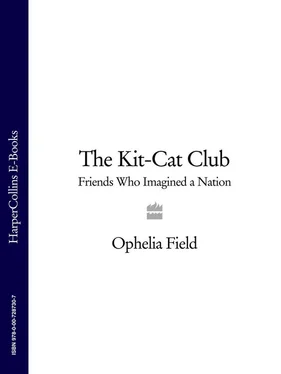I less affect to fiddle than to dance.
Business and Poetry do ill agree,
As the World says, and that's enough for me;
For some may laugh and swagger if they please,
But we must all conform that Love our Ease. 10
Montagu also made an advantageous match in 1688 to a rich sexagenarian widow whose first marriage (six years before Montagu's birth) had been to his relation, the 3rd Earl of Manchester. When Prior heard the news, he composed a poem about how ‘Chamont’ would be elevated above his reach by the marriage, comparing the wedding to an apotheosis: ‘Pleased that the Friend was in the God improved.’ 11 Montagu, however, sent his old school friends assurances that the married state would not lessen his desire for ‘a constant friendship and correspondence’ with them. 12
In reward for having escorted James II's younger daughter, Princess Anne, in her midnight escape to join the rebel forces in 1688, Dorset was appointed King William's Lord Chamberlain, the Court's chief functionary. Montagu, Prior and Stepney became popularly known as ‘Lord Dorset's Boys’, though Stepney at first received favours and ‘protection’ from Dorset only indirectly, and may not have met the Earl in person until a visit home from the German states in 1693. Prior remembered ‘Sneaking…among the Crew’ of ‘Crowding Folks with strange ill Faces’ who came to beg favours from Dorset after his appointment. 13
While Prior was ‘sneaking’, Montagu's career advanced at speed, thanks to brilliant performances in the Commons. By 1692, Montagu was a Privy Counsellor, alongside Somers and Dorset, a Lord of the Treasury, and the youngest addition to the Whig Junto. Montagu won the King's particular favour by loyally supporting the army supply Bills and promoting a Treasury plan to raise a million-pound loan for the government—a loan identified by the nineteenth-century historian Macaulay as the ‘origin’ of England's national debt, and still admired by recent historians, such as D. W. Jones, for its ingenuity. 14 Montagu thereafter became a dispenser of patronage in his own right—someone to whom Prior addressed epistolary poems, seeking patronage, much as Montagu had addressed Dorset only a few years earlier.
Montagu was also responsible for shepherding through Parliament the Act founding the Bank of England in 1694, in return for which he would gain the post of Chancellor of the Exchequer. Montagu personally pledged £2,000 (equivalent to some £235,000 today) to the Bank's first subscription, and was joined by many friends. Tonson, probably at the encouragement of Somers, subscribed £500. The new institution was closely tied to the interests of the Whig party, and to financing the Anglo-Dutch alliance. The Tories were less invested (literally and metaphorically) in finance capital. They felt increasingly insecure in the midst of this 1690s financial revolution, and Montagu was an easy figurehead for them to attack. His Tory enemies said Montagu was ‘a party-coloured, shallow, maggot-headed statesman’ 15 who caressed those who approached him with projects until he had all the details then mysteriously cooled towards them before stealing their ideas. Montagu thought of it merely as keeping an open door to proposals that might benefit the new nation.
While Montagu helped Stepney advance his diplomatic career, Dorset found a diplomatic posting for Prior in The Hague, the Anglo-Dutch allies' headquarters. Stepney often broke his journeys from Berlin back to England with a visit to Prior in The Hague, where the two would sit before ‘a good turf fire’, 16 roasting chestnuts, getting drunk and offloading their professional and private problems. Prior's lover at the time, a cook-maid nicknamed ‘Flanders Jane’ whom Prior declared he loved ‘above Interest or lust’, 17 would have refilled their glasses on these occasions. Stepney was meanwhile sowing his wild oats across central Europe during the early 1690s, writing frankly to a lady in Dresden who had romantic designs on him: ‘[T]o make love perfectly, methinks Body is as necessary an Ingredient as Brandy is in Punch. Your Wit and Friendship are very good sugar and nutmeg, but there must go something more to make the Dose complete.’ 18
At their sessions before the turf fire, Prior and Stepney also discussed the financial strain of living like gentleman-diplomats when they were entirely dependent upon the Treasury to reimburse their expenses. Both were aware that their humble births mattered more in Europe than at Westminster or Cambridge. Prior referred to himself as ‘Albion's meanest son’, 19 while Stepney was hurt when someone told the Elector of Saxony he was not of noble birth, which prevented the Elector from inviting him to dine for a month. In answer, Montagu and Dorset had Stepney made a Gentleman of King William's Privy Chamber, and Montagu arranged an advance on Stepney's salary, for which Stepney thanked Montagu warmly, calling him his ‘good Angel at the Brink of the Pool’. 20
On another occasion, Stepney told his mother he had declined a £1,000 personal loan from Montagu for reasons that show the men remained, in the early 1690s, more old school friends than patron and client: ‘[I]t is the last use any man should make of his friend, & which I should be sorry to be reduced to,’ Stepney declared. 21 Prior had less scruple about begging for cash from his old friend: ‘If you can get me any ready money, it would be more charity than to give alms to the poorest dog that ever gave you a petition; if not, patience is a virtue, and a scrap or two of Horace must be my consolation.’ 22
Like Somers, Montagu believed in the Ciceronian ideal that literary endeavour was an essential qualification for being a great statesman, and if one was not writing oneself, then playing patron to poets was the next best thing. Montagu and Dorset therefore ensured that Tonson published the witty, self-mocking verses that both Prior and Stepney continued to write in between the ‘prose affairs’ of international diplomacy. 23 Pursuing identical courses, and consulting one another on their poems in manuscript, they would not have guessed that Stepney would be remembered as one of England's first modern diplomats, while Prior would be remembered primarily as a poet.
Montagu, Prior and Stepney all wrote elegies on the occasion of Queen Mary's death in December 1694, to demonstrate their loyalty to the widowed King. The Tories had always felt more at ease with Mary, as a Stuart daughter, than with her husband's largely parliamentary claim to the throne, and Mary's death now meant William had to renew his bid for popular support. William's childlessness also placed increased importance on Mary's sister Anne, now William's heir apparent, and on Anne's choice of friends. From The Hague, Prior observed the political upheavals consequent upon Mary's death in a letter to Montagu:
These matters will be decided before the King's coming over, so we must have a vigilant eye. I call it ‘we’, for you, Sir, have always regarded my interest as if it were your own; and when I consider that you have taken your poor neighbour and made a friend of him, and solicited for that friend as if he had been your brother, I doubt not but you will have the reward you deserve (though a good while hence) in the Court of Heaven; and I the credentials I do not deserve to some Court or Republic a little nearer. 24
Another writer to produce an elegy on Mary's death, published by Tonson, was a young Fellow of Magdalen College, Oxford, named Joseph Addison. Addison was, like Prior and Stepney, a product of the late seventeenth century's widening access to education. He had attended Charterhouse, a charitable school and hospital then located near to today's Barbican Centre that was considered one of the best grammar schools in England. It took in forty nominated scholars for free, alongside sixty fee-paying non-boarders or ‘town boys’. 25
Читать дальше












